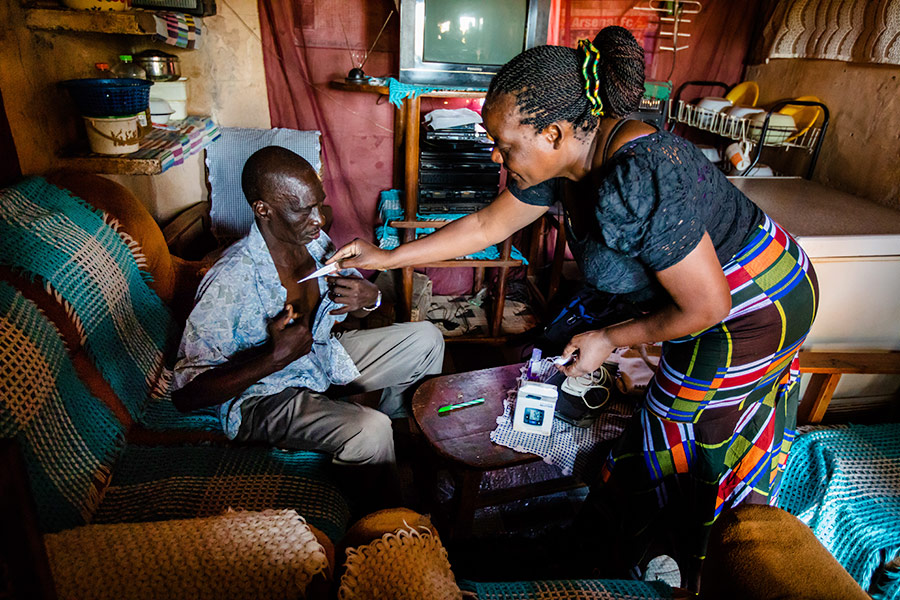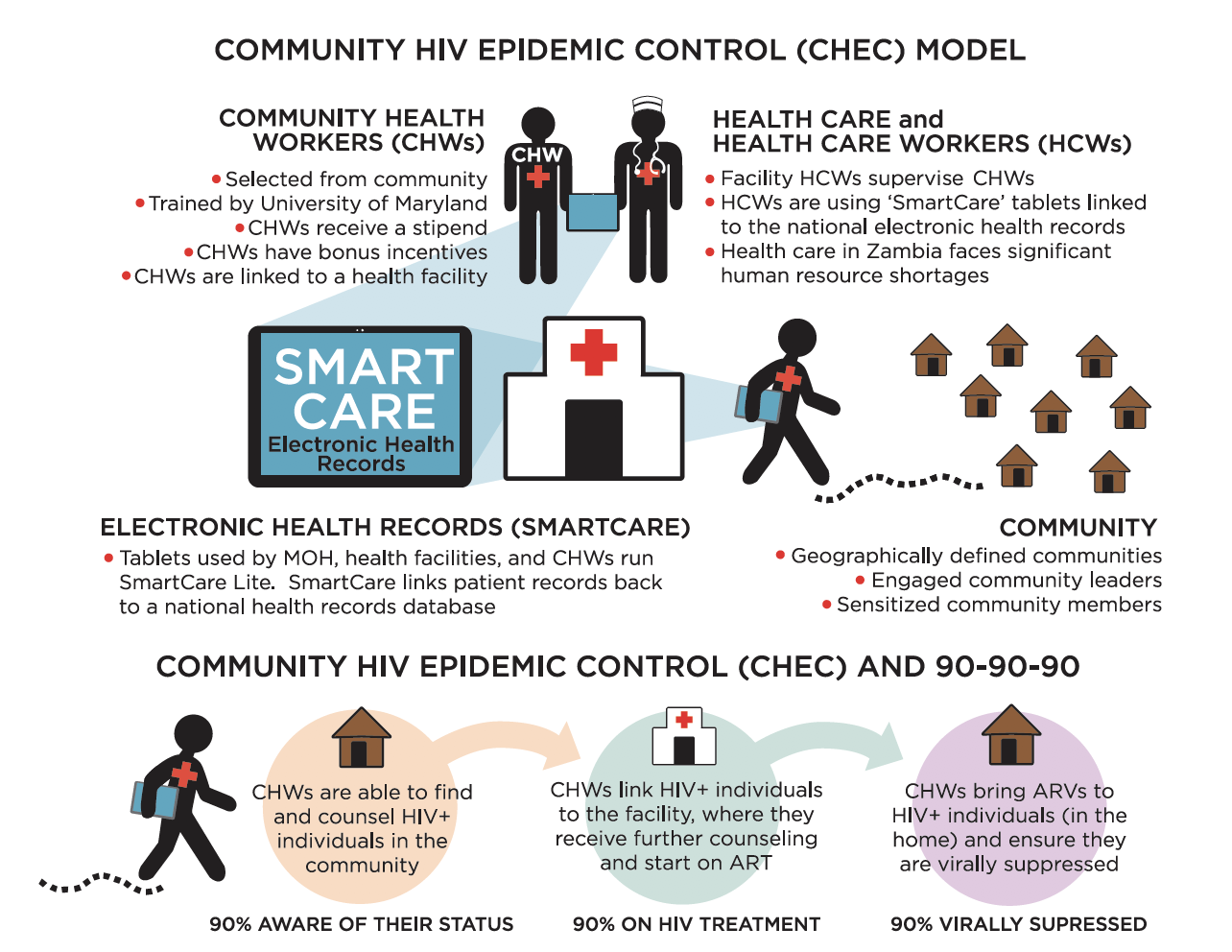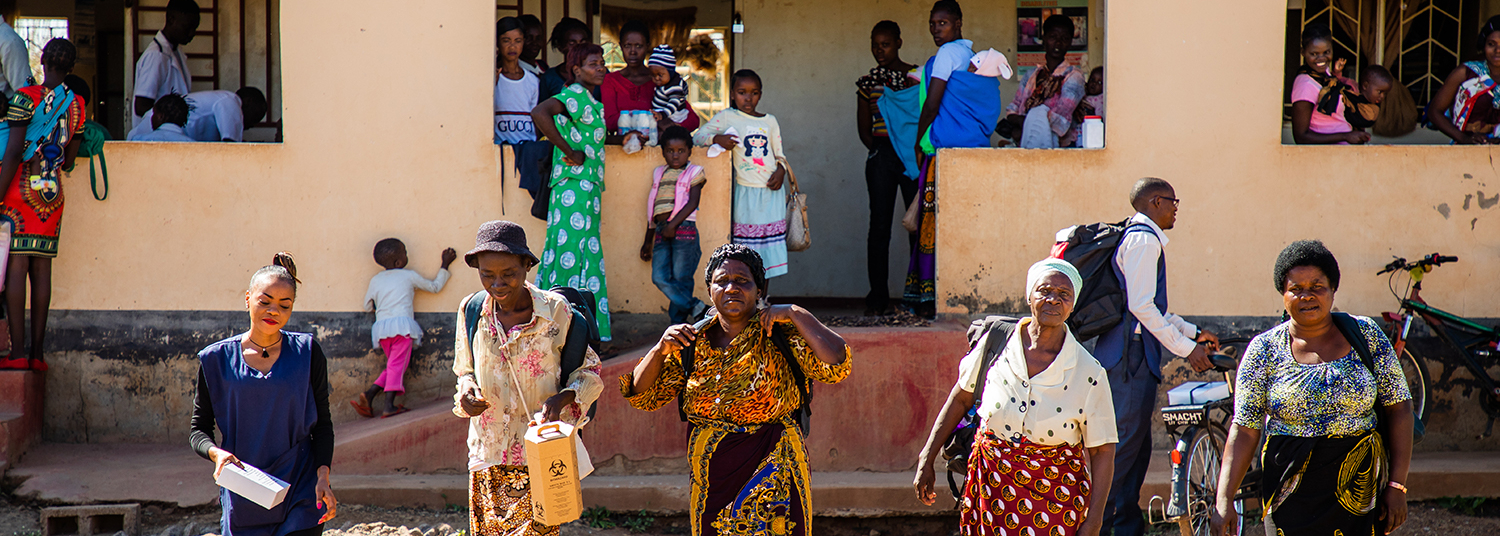Ciheb Zambia is currently staffed with more than 120 Zambian healthcare professionals and provides services to more than 300 health facilities in all four CDC-supported provinces. Ciheb also partners with the University of Zambia to provide advanced HIV and infectious disease training to Zambian physicians.
Ciheb was instrumental in helping develop key health initiatives in Zambia that have strengthened the nation’s HIV response. An early success was the 2010 adoption of tenofovir-based first-line antiretroviral (ARV) therapy, making Zambia the first African nation to use it on a wide scale.
Other milestones include the adoption of a nationwide test and treat policy in 2016, which has more than doubled the numbers of those receiving treatment, and the development of a pre-exposure prophylaxis (PrEP) policy for high-risk groups. Ciheb has also been a strong advocate for use of dolutegravir, an integrase inhibitor that is highly effective in suppressing HIV.
Ciheb has long recognized the need for developing local HIV medical capacity. In 2008, the University of Maryland, Baltimore (UMB) began a successful collaboration between the Ministry of Health, the University Teaching Hospital (UTH), and the University of Zambia (UNZA) to train Zambian physicians in advanced HIV medicine and infectious diseases. In 2008, UNZA, UTH, and Ciheb partnered to create a one-year postgraduate diploma in HIV medicine. The consortium then extended this to an 18-month Master of Science in HIV medicine.
In 2012, UNZA and UMB began offering a four-year clinical residency, the Master of Medicine in Infectious Diseases (MMed ID), which was later expanded to a five-year training program combining internal medicine and infectious disease (MMed IM/ID). Instruction is comprised of bedside teaching, didactic lectures, case conferences, and journal clubs. Instruction was mostly provided by UMB clinical faculty with expertise in HIV and infectious diseases. Faculty were either based in Zambia or visit from Baltimore. In 2018, the MMed ID program was completely handed over to the University of Zambia with continued technical support from UMB faculty based in Zambia and other ID physicians based in Zambia.
In 2015, Ciheb recognized an opportunity for global health learning exchanges between UMB and UTH. UMB faculty began an elective in Global Infectious Diseases and Tropical Medicine, with trainees coming from Baltimore to Lusaka for a one-month clinical experience. As of 2020, over 60 trainees have come to Zambia to participate in this rotation. In 2019, via special funding from the UMB President’s Global Impact Fund, Ciheb also started sending the first Zambian trainees to Baltimore for clinical experiences at UMMC.

Projects
Prison PrEP Values Adherence and Implementation in Lusaka (PrEVAIL). Incarcerated persons are at higher risk of HIV acquisition globally and especially in sub-Saharan Africa. The NIH R21 PreVAIL study (PI Claassen) will assess patterns of PrEP uptake and persistence, HIV incidence, and HIV risk perception among incarcerated people in Zambia, and conduct qualitative assessments of facilitators and barriers to efficacious PrEP use in this population both during and after incarceration. Lessons learned from PreVAIL will enhance HIV prevention efforts for prisoners in Zambia and the region.
Zambia Education Network for Implementation Science Training in Health (ZENITH). To reach HIV epidemic control, Zambia needs to develop local implementation science capacity to create innovative ways to reach key and vulnerable populations with HIV service delivery. To train this cadre of implementation scientists, we propose the Zambia Education Network for Implementation Science Training in Health (ZENITH), a partnership between Zambia’s University Teaching Hospital (UTH) and the University of Maryland Baltimore (UMB) that focuses on building implementation science (IS) capacity at UTH. ZENITH will build IS capacity through 1. an Implementation Science Institute at UTH (short-term training); 2. an online MHS in Implementation and Dissemination Science at UMB (medium term); and 3. PhD at UMB (long term); all coupled with twinned senior and junior mentors and a monthly research ECHO seminar.
Regional Strengthening of HIV-focused Population-based National Surveys and Size Estimations (RESPONSE). This initiative is drawing on lessons learned from Ciheb’s successful Nigeria population-based HIV impact assessment. It will combine a novel linkage-to-care approach to ensure that all HIV-positive individuals identified through the survey are efficiently linked to care and treatment.
Previous Projects
Community HIV Epidemic Control (CHEC)
Community HIV Epidemic Control (CHEC). Ciheb’s CHEC model is an innovative differentiated service delivery approach that addressed all three of the United Nation’s 90-90-90 HIV/AIDS targets: 90% of people living with HIV know their status, 90% who know their status are on ARV treatment, and 90% of those on ARV are virologically suppressed.
The principles of CHEC have been implemented in all three CDC grants primed by UMB. CHEC reached more than 200 government-run clinics in Zambia and involved more than 1,000 active community health workers. The health workers conducted over 1 million HIV tests, linked over 90% of those testing positive to health services, and delivered ARVs to over 2,000 stable-on-care patients.
Based on CHEC’s success, the Zambian Ministry of Health adopted the model as an approved differentiated service delivery model to be implemented in Zambia. CHEC is also listed as a strategy in the 2018 Zambia Consolidated Guidelines for Treatment and Prevention of HIV. (Download a copy of the CHEC Report)

Stop Mother and Child HIV Transmission (SMACHT)
Stop Mother and Child HIV Transmission (SMACHT). The Ciheb SMACHT project began as a prevention of mother-to-child transmission grant, but after its first year was expanded to a comprehensive HIV care-and-treatment grant, with support provided to over 300 facilities in the Southern Province.
SMACHT has been using the CHEC model to improve maternal-child HIV outcomes by linking every HIV-infected pregnant woman with a community health worker who ensures completion of the care cascade. Because of its demonstrated ability to improve service delivery, SMACHT was expanded to provide “test and treat” interventions to the general population—a strategy in which at-risk populations are screened for HIV infection and positive individuals receive immediate treatment.
More than 300,000 people have received HIV testing services through SMACHT with 6.6% of those people testing positive. Of the nearly 25,000 people who newly tested positive, about 70% were enrolled on ART, and 78% were linked to a healthcare facility.
Zambia Community HIV Epidemic Control for Key Populations (Z-CHECK)
Building on the success of the CHEC and SMACHT initiatives, Ciheb developed and launched Z-CHECK. Under Z-CHECK, Ciheb has led national health policy development for adoption of HIV pre-exposure prophylaxis (PrEP). The project focuses on providing community linkage to the health facilities to improve the targets for UNAID 90-90-90 goals in the Southern and Lusaka Provinces. Z-CHECK has focused primarily on target populations, including adolescents, pregnant women and their children, young men, men who have sex with men, female sex workers, transgenders, injection drug users, and prisoners. Z-CHECK has also been the leader in PrEP in Zambia.
Community Impact to Reach Key and Underserved Individuals for Treatment and Support (CIRKUITS)
CIRKUITS has become a leader in HIV case finding using an index testing approach and is helping Zambia close the remaining gaps in epidemic control. CIRKUITS utilizes a targeted community approach to improve HIV prevention, care, and treatment outcomes in Lusaka, Eastern, and Western Provinces to achieve the UNAIDS 95-95-95 goals of epidemic control. CIRKUITS focuses on providing HIV service from community peers to adolescents; key populations including men who have sex with men, female sex workers, and prison populations; men under 30 and transient populations; pregnant and breastfeeding women and their families; as well as the general population.
In the next fiscal year (FY21), both Z-CHECK and CIRKUITS will receive funding from CDC to initiate DREAMS. DREAMS is a global, public-private partnership between the President’s Emergency Plan for AIDS Relief (PEPFAR), Bill & Melinda Gates Foundation, Girl Effect, Johnson & Johnson, ViiV Healthcare, and Gilead. The program seeks to reduce new HIV infections in adolescent girls and young women (AGYW), who are between 10-24 years old, across 10 sub-Saharan African countries. DREAMS is designed to meet the complex needs of AGYW by helping them become more Determined, Resilient, Empowered, AIDS-free, Mentored, and Safe.

